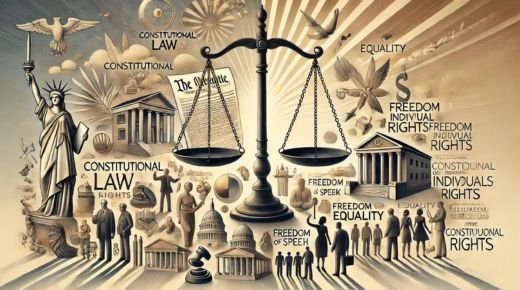Introduction
Constitutional law forms the bedrock of any democratic society, outlining the framework for government operation and safeguarding individual rights. It serves as the highest law of the land, ensuring that all other laws comply with its principles. This article explores the pivotal role of constitutional law in protecting individual rights, examining its historical evolution, key provisions, and the impact on everyday life.
Historical Evolution of Constitutional Law
The concept of constitutional law has evolved significantly over time. Its roots can be traced back to ancient civilizations where rudimentary forms of constitutional principles were practiced. However, the modern interpretation of constitutional law began to take shape in the 17th and 18th centuries with the development of constitutional documents like the Magna Carta, the English Bill of Rights, and, notably, the United States Constitution.
The U.S. Constitution, adopted in 1787, is a prime example of how constitutional law can enshrine individual rights. Its Bill of Rights, the first ten amendments, explicitly protects freedoms such as speech, religion, and the press. This document was revolutionary in its time, as it established a framework for a government that respected and protected individual liberties.
Key Provisions of Constitutional Law
Constitutional law is composed of various key provisions designed to safeguard individual rights. These provisions can vary from country to country, but several fundamental principles are commonly found across democratic nations:
- Freedom of Speech and Expression: One of the cornerstones of constitutional law is the protection of freedom of speech and expression. This right allows individuals to express their opinions and ideas without fear of government censorship or retaliation. It is crucial for fostering a democratic society where diverse viewpoints can be heard and debated.
- Right to Privacy: The right to privacy is another critical aspect of constitutional law. It protects individuals from unwarranted government intrusion into their personal lives. This includes safeguarding personal data, communications, and the sanctity of one’s home.
- Right to a Fair Trial: Constitutional law guarantees the right to a fair trial, ensuring that individuals accused of crimes receive a just legal process. This includes the right to legal representation, a fair and impartial jury, and protection against self-incrimination.
- Equal Protection Under the Law: The principle of equal protection mandates that all individuals are entitled to the same rights and protections under the law, regardless of race, gender, religion, or socioeconomic status. This provision is essential for combating discrimination and promoting social justice.
- Due Process: Due process ensures that the government follows legal procedures before depriving an individual of their rights or property. It guarantees that individuals receive notice of legal actions against them and have the opportunity to be heard.
Impact of Constitutional Law on Everyday Life
The influence of constitutional law extends far beyond the courtroom and legislative halls. Its provisions shape many aspects of daily life, ensuring that individual rights are upheld in various situations:
- Freedom of the Press: Constitutional protections for the press ensure that media outlets can report news and hold those in power accountable. This freedom is crucial for informing the public and fostering transparency in government.
- Personal Privacy: Constitutional protections against unreasonable searches and seizures safeguard personal privacy. This is particularly relevant in the digital age, where issues like data breaches and government surveillance have become significant concerns.
- Legal Protections: The right to a fair trial and legal representation ensures that individuals facing legal challenges receive a fair and just process. This includes protections for defendants in criminal cases and parties in civil disputes.
- Equality and Anti-Discrimination: Constitutional provisions against discrimination play a vital role in promoting equality and protecting marginalized groups. They provide a legal framework for challenging discriminatory practices and advocating for civil rights.
Challenges and Controversies
Despite its foundational importance, constitutional law is not without its challenges and controversies. Various issues can arise, including:
- Balancing Rights and Security: One of the ongoing debates in constitutional law is balancing individual rights with national security concerns. Issues such as government surveillance and anti-terrorism measures often raise questions about the extent to which individual freedoms can be restricted for security purposes.
- Evolving Interpretations: Constitutional provisions are often subject to interpretation by courts. This can lead to differing opinions on the scope and application of rights, especially as societal norms and technologies evolve.
- Global Variations: Different countries have different approaches to constitutional law, reflecting their unique historical, cultural, and political contexts. While the core principles of protecting individual rights are common, the specific provisions and interpretations can vary widely.
Conclusion
Constitutional law plays a crucial role in protecting individual rights and ensuring the functioning of a democratic society. Its key provisions—such as freedom of speech, right to privacy, fair trial, equal protection, and due process—form the foundation for safeguarding personal liberties and promoting justice.
As societies evolve and new challenges emerge, the interpretation and application of constitutional law will continue to play a critical role in addressing contemporary issues and preserving fundamental rights. By understanding and upholding these principles, individuals and governments alike can work towards a more just and equitable society.
Whether in daily life or in times of legal dispute, the impact of constitutional law is profound, reminding us of the importance of maintaining a balance between individual freedoms and societal needs. Its enduring relevance underscores the commitment to protecting the rights and dignity of every person, ensuring that the principles of justice and equality remain at the heart of our legal system.





